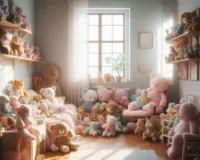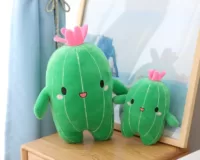Stuffed animals have been a beloved childhood staple for generations, providing comfort, security and joy to children of all ages. But beyond their cute and cuddly exterior, these plush companions play a crucial role in a child’s development and overall wellbeing.
From emotional security to social skills and creativity, stuffed animals have proven to be an important tool in a child’s growth and cognitive development. They provide a sense of familiarity and comfort, teaching children empathy, communication and decision-making skills through imaginative play.
But why are stuffed animals so important? Let’s take a closer look at the various ways in which these fluffy friends impact a child’s life, and the lasting benefits they can offer into adulthood.
Join us as we explore the significance of stuffed animals and their role in childhood development.
Discover the emotional security they provide, how they can aid in social skills and cognitive development, the comfort they offer in bedtime routines, and the therapeutic benefits they hold. We will also delve into the joy of collecting stuffed animals and the nostalgia that they can evoke.
Overall, it’s clear that stuffed animals are more than just toys; they are an important part of childhood and can have a lasting impact on a person’s life.
So, why are stuffed animals important? Let’s find out.
Emotional security
Stuffed animals offer children a sense of emotional security, acting as comforting companions that provide a feeling of safety and reassurance. Children commonly attach themselves to their favourite stuffed animal during a stressful situation, reducing anxiety and promoting resilience.
The act of cuddling and holding a stuffed animal also triggers the release of the hormone oxytocin, which helps to promote feelings of love and security. This can have a calming effect on children, helping them to relax and feel safe in their surroundings.
Stuffed animals can also act as transitional objects, helping children to cope with separation anxiety when away from their parents or caregivers. By providing a tangible and comforting source of familiarity, children can feel more secure and confident when facing new situations or environments.
Stuffed animals can also help children to develop a sense of empathy, as they may attribute emotions and personalities to their plush companions. This can help children to better understand and relate to others, leading to stronger social skills and emotional intelligence.
Overall, stuffed animals play an important role in promoting emotional security in children, providing a source of comfort and familiarity that can help them feel safe and secure in the world around them.
Social Skills and Stuffed Animals
Stuffed animals are more than just cute and cuddly toys; they can play a significant role in a child’s social development. Children often engage in imaginative play with their plush companions, which can help them develop social skills in various areas.
Role-playing and Empathy
Playing with stuffed animals can help children develop empathy and understanding of different perspectives. They often role-play scenarios with their stuffed animals, taking on different roles and interacting with their plush companions. This type of play can help children understand their own emotions and those of others, as well as learn social skills such as sharing, taking turns, and compromising.
Communication and Language Skills
Stuffed animals can also aid in the development of communication and language skills. Children often talk to their plush companions, narrating their play scenarios and creating stories. This type of play encourages language development and can help children become more comfortable with expressing themselves verbally. Additionally, playing with stuffed animals can also help children develop their listening skills as they engage in pretend conversations with their plush companions.
Group Play
Stuffed animals can also facilitate group play, which is an essential aspect of social development. Children can engage in imaginative play with their friends and their stuffed animals, allowing them to learn how to interact in a group setting and develop social skills such as cooperation and teamwork.
In conclusion, stuffed animals can play a vital role in the development of a child’s social skills. Through imaginative play, role-playing, and group play, children can develop empathy, communication and language skills, and learn to interact in a group setting. Therefore, stuffed animals are not just a toy, but an important tool in promoting social development in children.
Creativity and Stuffed Animals
Stuffed animals are not just cuddly companions for children; they are also powerful tools for fostering creativity and imaginative play.
With a little creativity, the possibilities for play with stuffed animals are endless. Children can create their own stories, scenarios, and adventures with their plush companions, using them as characters in their imaginative worlds. They can also come up with new names for their stuffed animals or invent new activities to do with them.
Encouraging Imaginative Play
Stuffed animals encourage imaginative play by providing children with a blank canvas to create their own stories and scenarios. They can use their plush companions to reenact scenes from their favourite books or movies or invent completely original storylines. They might imagine their stuffed animals as superheroes, explorers, or royalty.
In this way, stuffed animals can help children develop their creativity and imagination. By playing with their stuffed animals, kids can learn to think outside the box, to come up with new ideas, and to explore different possibilities. They can also practice their storytelling skills, learn to articulate their ideas, and develop their vocabulary.
Role-Playing and Pretend Play
Stuffed animals can also be valuable tools for role-playing and pretend play. Children can use their plush companions to act out different roles and scenarios, practicing their social skills and empathy in the process.
For example, they might pretend to be a veterinarian, caring for their stuffed animals and learning about animal health. They could also imagine themselves as a teacher, giving their stuffed animals lessons on different subjects. By doing so, children learn to see situations from multiple perspectives, develop their communication and language skills, and learn to empathize with others.
Overall, stuffed animals are much more than just toys; they are powerful tools for fostering children’s creativity, imagination, and social skills. By encouraging imaginative play, role-playing, and pretend play, stuffed animals can help children develop a range of valuable skills and traits.
Cognitive Development and Stuffed Animals
Stuffed animals play a vital role in a child’s cognitive development. Children engage in imaginative play with their plush companions, allowing them to explore different scenarios and develop problem-solving skills. For example, a child may create a pretend scenario where their stuffed animal is sick, and they need to find a way to make them feel better. This pretend play helps children learn how to make decisions, think critically, and come up with creative solutions to problems.
In addition to problem-solving, stuffed animals also promote cognitive flexibility. By engaging in imaginative play with their stuffed animals, children learn how to think about things from different perspectives and develop a better understanding of cause and effect. They also learn how to switch between different roles and scenarios seamlessly, which helps to develop cognitive flexibility.
Aside from imaginative play, stuffed animals can aid in the development of language and communication skills. Children often talk to their stuffed animals, telling them stories, and engaging in conversations. This type of play helps to develop their vocabulary and language skills, as well as their ability to communicate effectively with others.
Stuffed Animals and Cognitive Development: Pretend Play
Pretend play is an essential aspect of cognitive development for children, and stuffed animals are a perfect tool for this type of play. They allow children to engage in imaginative play, which promotes problem-solving, cognitive flexibility, and language and communication skills. By creating different scenarios and pretending with their stuffed animals, children can learn and develop in a fun and engaging way.
Comfort and Sleep: The Soothing Benefits of Stuffed Animals
Stuffed animals have long been associated with comfort and sleep, serving as trusted companions for children as they drift off to dreamland. These plush toys offer a sense of familiarity and security, providing a soothing presence that can help ease any bedtime anxieties.
Studies have shown that incorporating stuffed animals into a child’s bedtime routine can be beneficial for promoting quality sleep. The presence of a favourite stuffed animal can help reduce stress and anxiety, creating a sense of calm and relaxation that can aid in falling asleep faster and staying asleep longer.
Furthermore, the tactile comfort provided by stuffed animals can help regulate a child’s breathing and heart rate, promoting a deeper and more restful sleep. Children may also develop an attachment to their stuffed animal, associating it with feelings of comfort and security, which can have a positive impact on their emotional well-being.
It’s worth noting that stuffed animals should be used safely in the sleep environment, as recommended by health professionals. For example, it is generally recommended that infants under 12 months should not have soft toys in their crib or bed due to potential safety risks.
In conclusion, stuffed animals can play an important role in promoting comfort and better sleep for children. From reducing bedtime anxiety to providing a soothing presence and developing attachments, these plush companions can be a valuable addition to any child’s bedtime routine.
Therapeutic Benefits of Stuffed Animals
Stuffed animals have been found to offer a range of therapeutic benefits for children.
Play therapists, in particular, have long recognized the value of stuffed animals in helping children deal with difficult emotions and traumatic experiences.
Emotional Regulation
Stuffed animals can serve as a comforting presence for a child, providing a source of emotional support and helping them to regulate their emotions.
Research has shown that holding a stuffed animal can have a calming effect on children, reducing anxiety and promoting a sense of safety and security.
Play Therapy
Stuffed animals are often used in play therapy as a tool to help children express themselves and work through their emotions.
Through role-playing and imaginative play, children can explore difficult situations and emotions in a safe and supportive environment.
Coping with Stress and Anxiety
Stuffed animals can also help children cope with stress and anxiety.
When faced with a challenging situation, a child can turn to their stuffed animal for comfort and support. The act of holding and cuddling the stuffed animal can help to reduce stress levels and promote feelings of calmness and relaxation.
Overall, the therapeutic benefits of stuffed animals are numerous and varied. From promoting emotional regulation to assisting in play therapy and coping with stress and anxiety, these plush companions can be a valuable resource for children in need of comfort and support.
Collecting and Nostalgia
Stuffed animals have long been cherished companions for children, and for some individuals, the sentimental value of these toys extends into adulthood. Many people have fond memories of their beloved stuffed animals, and some even collect them as a hobby or for nostalgic purposes.
The act of collecting stuffed animals can be a source of joy and comfort, offering a tangible connection to one’s childhood memories. The sentimental value of these toys is immeasurable, and collecting them can be a way of preserving fond memories and reliving happy moments of the past.
Some people also collect stuffed animals as a form of self-expression or to showcase their personal style. Collecting vintage or rare stuffed animals can be a fun and exciting hobby, with each new addition adding to a unique and treasured collection.
The Nostalgia of Stuffed Animals
For many individuals, the sentimental value of stuffed animals lies in the memories they evoke. These toys have the power to transport us back to a simpler time, evoking feelings of comfort, security, and happiness. As we grow older, the act of holding onto these objects can be a way of holding onto our childhood selves and the carefree days of youth.
Stuffed animals can also offer a sense of comfort in times of stress or uncertainty, serving as a familiar and soothing presence that brings feelings of safety and reassurance.
The Joy of Collecting
Collecting stuffed animals can be a fun and rewarding hobby, allowing individuals to express their unique sense of style and personality. Whether it’s collecting vintage teddy bears, rare animal plushies, or character-themed toys, the act of seeking out and acquiring new additions to a collection can be exciting and fulfilling.
For those who collect stuffed animals, the value of these toys goes beyond their monetary worth. Each plush toy represents a cherished memory or moment in time, and the act of collecting them can be a way of preserving these memories for years to come.
Conclusion
Stuffed animals have a special place in the hearts of many individuals, offering a source of comfort, joy, and nostalgia. Whether it’s collecting them as a hobby or holding onto beloved childhood companions, these toys have the power to evoke happy memories and bring feelings of comfort and security.
Conclusion
Stuffed animals are more than just cute and cuddly toys. They play an important role in children’s development, offering emotional security, aiding in social skills, fostering creativity and imagination, promoting cognitive development, and providing comfort and therapeutic benefits.
Stuffed animals act as comforting companions, offering a sense of safety and reassurance, which is essential for emotional security. They also aid in the development of social skills, through role-playing, empathetic interactions, and communication and language skills.
Furthermore, stuffed animals encourage creativity and imaginative play, allowing children to create stories, scenarios, and adventures with their plush companions, promoting cognitive development and problem-solving skills. They also provide comfort and promote better sleep, serving as familiar and soothing objects in their bedtime routines, and are even used in play therapy and coping with stress and anxiety.
In addition to these benefits, stuffed animals can also foster sentimental value as they become objects of nostalgia and joy even into adulthood. Overall, stuffed animals are an essential part of childhood and an important tool for children’s growth and development.
FAQ
Why are stuffed animals important?
Stuffed animals play a crucial role in a child’s development, providing emotional security, fostering social skills and creativity, promoting cognitive development, offering comfort, and even having therapeutic benefits. They serve as comforting companions that offer a sense of safety and reassurance, aid in the development of social skills through role-playing and empathetic interactions, encourage creativity and imaginative play, contribute to cognitive development through problem-solving and decision-making, provide comfort and promote better sleep, and can even be used in therapy or to cope with stress and anxiety. Stuffed animals also hold nostalgic value and can be collected and cherished even into adulthood.
How do stuffed animals provide emotional security?
Stuffed animals act as comforting companions that offer a sense of safety and reassurance to children. They provide emotional security by being a source of comfort during times of stress, anxiety, or loneliness. Children often form deep attachments to their stuffed animals, treating them as confidants and relying on them for emotional support.
What role do stuffed animals play in developing social skills?
Stuffed animals can aid in the development of social skills in children. Through role-playing with their plush companions, children learn to interact with others, develop empathy, and improve their communication and language skills. Stuffed animals can also serve as a bridge for shy or introverted children, helping them feel more comfortable in social situations.
How do stuffed animals encourage creativity?
Stuffed animals inspire imaginative play, allowing children to create stories, scenarios, and adventures with their plush companions. This type of play stimulates creativity, problem-solving skills, and cognitive flexibility. Stuffed animals become characters in their make-believe worlds, fostering a child’s imagination and encouraging them to think outside the box.
What impact do stuffed animals have on cognitive development?
Stuffed animals can have a positive impact on cognitive development. Through pretend play with their plush companions, children engage in problem-solving, decision-making, and cognitive flexibility. They learn to think critically and creatively, enhancing their cognitive skills and intellectual growth.
How do stuffed animals provide comfort and promote better sleep?
Stuffed animals serve as familiar and soothing objects in a child’s bedtime routine. They provide comfort and a sense of security, making it easier for children to relax and fall asleep. The presence of a beloved stuffed animal can create a calming atmosphere, helping children feel safe and protected during the night.
What are the therapeutic benefits of stuffed animals?
Stuffed animals have therapeutic benefits and can be used in various therapeutic settings. They are often used in play therapy to facilitate emotional expression, communication, and problem-solving. Stuffed animals can also assist in emotional regulation, helping children cope with stress, anxiety, and traumatic experiences.
Do stuffed animals hold any nostalgic value?
Yes, stuffed animals can hold nostalgic value for individuals. Many people have fond memories of their childhood stuffed animals and may continue to collect them or keep them as treasured mementos even into adulthood. These plush companions can evoke feelings of warmth, comfort, and nostalgia, reminding us of cherished moments from our past.
How significant are stuffed animals in a child’s development?
Stuffed animals play a significant role in a child’s development. They provide emotional security, foster social skills and creativity, promote cognitive development, offer comfort and better sleep, and even have therapeutic benefits. Their presence can have a positive impact on a child’s emotional, social, and cognitive well-being, making them an important and cherished part of childhood.





